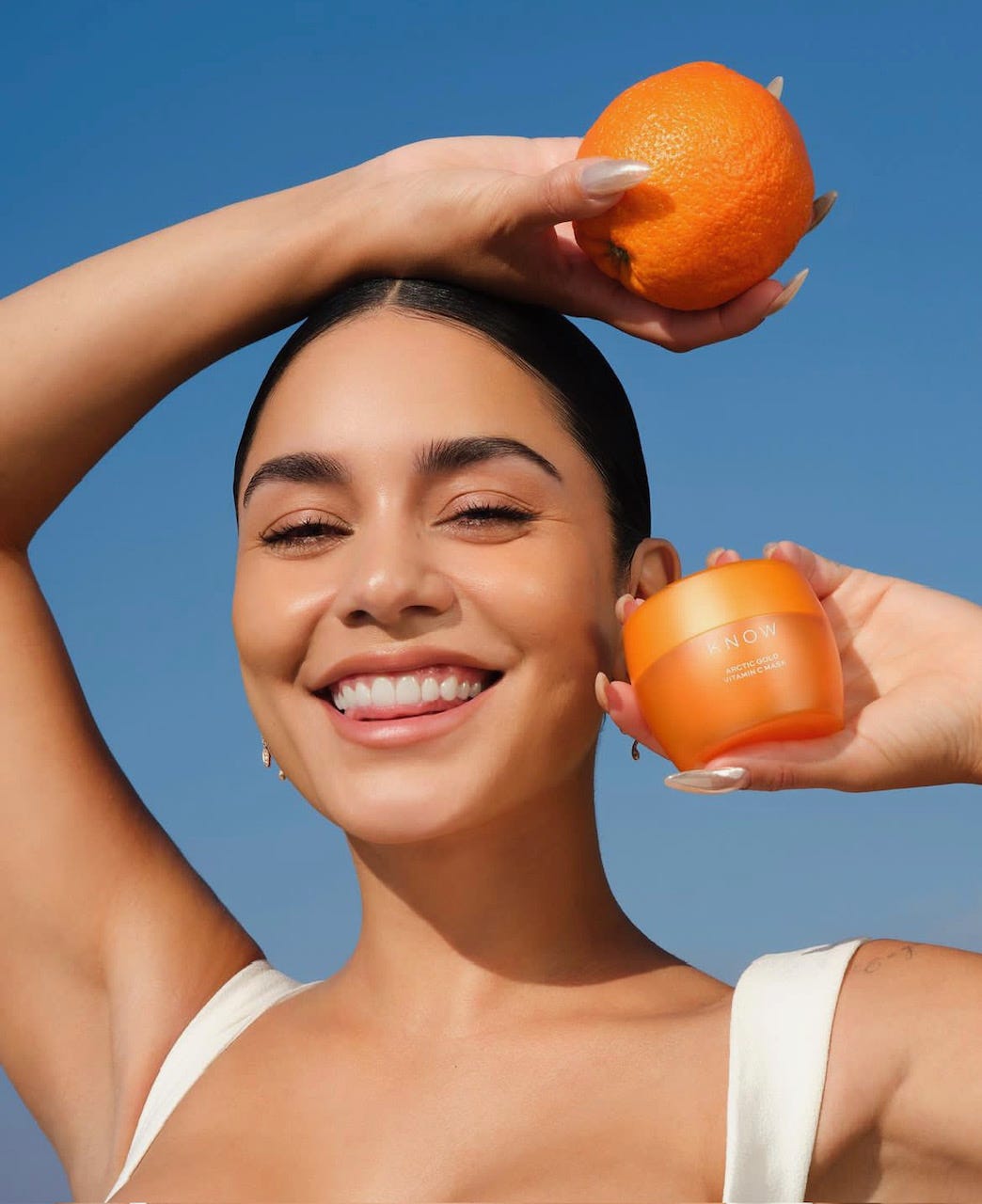Vanessa Hudgens is all smiles in a recent campaign photo for her skincare brand KNOW Beauty. She holds a $1.49 navel orange in one hand and her $45 Arctic Gold Vitamin C mask in the other.
Is Hudgens smiling like that because she’s successfully scammed customers out of $43.51? Maybe! As I’ve shared before: Antioxidant vitamin C does indeed stimulate collagen production and protect cells from pollution, but there is zero evidence that applying it directly to your face (with, for example, an overnight mask) is more effective than ingesting it (by, say, eating an orange).1 There is plenty of evidence that topical vitamin C skincare is more pricey, more stressful for your microbiome and moisture barrier, and less likely to reach the collagen-producing layer of your skin than the edible kind, though.2
Dr. James Hamblin writes in his book Clean: The New Science of Skin (which is not about “clean beauty” but rather, the history of “cleanliness” and the damage done by industrialized skincare):
“The definite way to get vitamin C into your body’s cells is the less trendy, time-tested option of eating fresh fruits and vegetables. These also contain other elements like fiber that benefit the microbiome. The stomach contains strong acids your skin lacks that are made to absorb nutrients like vitamin C … Unless a product has a low enough pH to make it through the skin’s acid mantle, your skin will basically carry the product on the outside.
There’s some evidence that topical vitamin C can change the skin3 …. but this approach has not proven any more effective than simply eating vitamin C, and the exact same compound, when mixed into skin products, can become exorbitantly expensive.”
A paperback copy of Clean is $17. Even if you buy that and an orange a day, you’ll still have a fatter wallet (and, probably, better-functioning skin) than the customers who purchase Vanessa Hudgens’ KNOW Beauty Vitamin C mask (or any other vitamin C skincare product).
Other vitamin C-rich foods include: kiwi, cauliflower, bell pepper, broccoli, strawberries, papaya, lemon, lychees, Kakadu plums, acerola cherries, cantaloupe, kale…
You can find more information about how eating your skincare is a more effective way to get essential nutrients to the lower layers of your skin here.
Of course, disciples of the almighty skincare industry will have studies on vitamin C skincare at the ready. For the most part, these studies will prove that some vitamin C skincare can aesthetically manipulate the skin, which is not the same as supporting the functioning of the skin.





Thanks for this post! I always appreciate your posts about the sneak attacks of beauty culture masquerading as "wellness," yuck. Will def pick up that book, too. I'd just throw in that gardening is not only a cheaper way of getting C, but digging in dirt supercharges your microbiome and has been shown to have antidepressant effects. I grew dandelion greens (huge C in those!) in my community garden box for a while - Whole Foods sells bunches of them for $8, wshew! Just the process of growing dandelions (and okra and herbs and tomatoes and cucumbers) and cooking them in my kitchen ... it's the C, but it's also the experience of being outside with other people, and developing a relationship with the plants, the weather, etc. I find it helps a lot, and not just on the vitamin front. I still have plenty of days where the posts or ads about hair, skin, "apron belly" etc. are flowing on Instagram and I get that crawly sensation that I've failed as a human with a body. Getting my ass out in the yard and pulling weeds or planting stuff is a great antidote, a reminder that the world is SO MUCH BIGGER AND MORE MAGICAL than Vanessa Hudgens and her topicals would have us believe.
: )
Does continuing to use a 3 year old lipstick count as working on my microbiome? Please say yes.